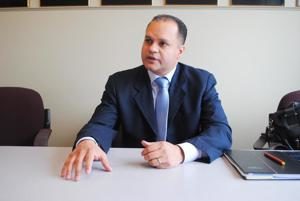
District attorney candidate Jose Nieves grew up in East New York, Brooklyn in the 1980s and ’90s. His mother, a Puerto Rican immigrant, raised him and his six brothers by herself. She worked as a street vendor by day and a livery cab dispatcher by night.
Crime in the city was sky-high then. And few if any neighborhoods had it worse than his.
One day he was walking home from the YMCA on Jamaica Avenue around 8 p.m. A cop car pulled up on the sidewalk.
Having been frequently racially profiled before, he knew the drill. “They would stop you, frisk you and let you go on your way,” Nieves said in a sitdown interview last Friday with the Queens Chronicle.
“But that night they didn’t.”
Without saying why, they held him and told him to wait a few minutes.
He saw an unmarked NYPD car moving slowly towards him on Jamaica.
“And my heart sank,” said Nieves.
This wasn’t a stop-and-frisk, he realized.
“I just prayed to God,” the candidate said. “Praying that no one misidentified me, claiming I did something wrong.”
The unmarked car pulled up next to him and the officers kept holding him.
It drove away. An officer told Nieves he could go home. So he did.
Still shocked, he spoke to one of his brothers about the situation when he got home.
“He said, ‘Listen, you can do two things. You can get mad, you can mouth off at the police and then they’ll stop you and you’ll get yourself arrested,’” said Nieves. “‘Or you can do something to change the system. You can do something to improve the community and do something for yourself and your family.’”
He went with the second choice.
After getting a bachelor’s degree in criminal justice from St. John’s University, Nieves graduated from Brooklyn Law School in 2001 and afterwards went to work for that borough’s district attorney. He moved to Queens after law school and now lives in Queens Village.
As an assistant district attorney in Brooklyn, he was proud to be part of a place where prosecutors were implementing reforms.
“It was the right thing to do because we were giving people second chances,” he said. “We were giving people the opportunity to turn their life around, rather than just charging and incarcerating individuals.”
Vying in a crowded Democratic primary field to replace Queens District Attorney Richard Brown, Nieves says he’s distinguished by his extensive experience and deep commitment to changing the criminal justice system.
For more than a decade, he served as a U.S. Army Reserves captain. He was deployed in 2009 for a one-year tour of duty in Afghanistan, where he advised officials there seeking to build a strong judicial system. The military honorably discharged him in 2014.
His career also includes prosecutorial work at the U.S. Department of Transportation and the U.S. Attorney’s Office for the Northern District of New York.
The city Department of Correction hired Nieves in 2014. There, he was a lead attorney prosecuting officers at the Rikers Island jail complex for excessive force against inmates.
“These cases included very severe injuries, like a broken back, broken eye sockets, a fractured head,” he said.
After that, he worked as deputy chief for the state Attorney General’s Office’s Special Investigations and Prosecutions Unit. Because of an executive order signed by Gov. Cuomo in 2015, the unit is tasked with special prosecutions in cases in which police officers are connected with civilian deaths.
Nieves, who stepped down from the job to run for district attorney, handled the first-ever homicide cause launched by the unit against an NYPD officer because of the directive.
Like others in the race, Nieves says Queens is long overdue for criminal justice reform.
He wants to end cash bail, implement discovery reform, consider immigration status when making plea deals, divert defendants in many cases away from the criminal justice system and decline to prosecute low-level offenses. He favors closing the Rikers Island jails and using the old House of Detention as a replacement facility in Queens.
But he says he has specific policy positions that go beyond his those of his rivals.
For example, Nieves favors the creation of a conviction integrity review unit, like others in the race do. But he also wants the unit to have an advisory council that has on it “community reform organizations,” clergy members and wrongfully incarcerated people.
He also says the District Attorney’s Office must have a unit that helps incarcerated people it prosecuted re-enter society.
“We have to identify those people … and connect them with the services they need six months before they’re released,” he said, adding that the unit would help drive down recidivism and enhance public safety.
Specifically, it would connect former prisoners moving back into their communities with “vocational services, employment services, housing services, educational services, drug programs and mental health resources.”
Nieves said he would not prosecute individuals for prostitution. In Queens, sex work is often linked with human traffickers, a group that the candidate pledges to punish with the full weight of the law. He noted that Brown has staff members who focus on trafficking but said more needs to be done.
“I want to build it up to a complete unit,” he said, one led by a bureau chief with attorneys, assistants and investigators who have all been trained in how to effectively combat the illicit industry.
Additionally, Nieves said the unit would coordinate with city and state agencies to “create a real dynamic where you’re putting a dent in the rings and you’re putting a dent in the industry, especially in Queens.”